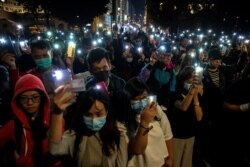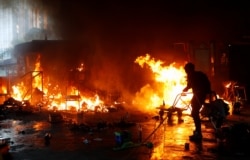Cambodia reiterated its robust support of Chinese attempts to quell violent protests in the semiautonomous city of Hong Kong, citing its adherence to the ‘One China’ policy.
Hong Kong protestors and police forces have routinely clashed for 21 weeks, initially over opposition to a legislative bill that would have allowed extradition from Hong Kong to mainland China.
While the bill was eventually withdrawn by Hong Kong chief Carrie Lam, the protests have taken on a wider pro-democracy tone to oppose increasing Chinese influence in the economic hub.
However, the violence surrounding the protests has progressively intensified over the months, as evidenced by the tense exchanges between student protestors and security officials at the Hong Kong Baptist University last weekend, which saw the university shrouded in tear gas and smoke from Molotov cocktails.
Speaking to VOA Khmer, Cambodian government spokesperson Phay Siphan said Cambodia continued to back China, as was consistent with the Kingdom’s foreign policy stand to support the ‘One China’ policy.
He said Hong Kong was a part of China, the protests were an internal matter, and that Cambodia would not interfere in what it considered was a Chinese issue.
“The Royal Government of Cambodia has stated many times that it is important we respect the ‘One China’ policy,” he said this week.
“So, we classify Hong Kong as the territory of China and that there should not or must not be interference from others for any reason at all.”
Phay Siphan’s comments are in line with Cambodian policy to adhere to the ‘One China’ policy. On the issue of non-interference, China has made similar comments in its support of Cambodia, as the country orchestrated its harshest crackdown on the political opposition, NGOs and media organizations starting in 2017.
In August, Cambodia had issued a statement supporting China’s effort to quell protests in Hong Kong. The Chinese Embassy had also released a Khmer-language statement in which it thanked Cambodia for its support on the deeply divisive issue.
Cambodian People’s Party Senator Sok Eysan said it was China’s prerogative to deal with the protests and that other countries should not try to influence the protestors or China.
“I understand that a super power, like China, would not allow some people or one million people (to do that). It’s not a problem,” Sok Eysan said.
“It [Hong Kong] is the sovereign state of China, which is under the rule of China, and so applying another country’s laws is not appropriate,” he added, referring to the United States.
The United States Congress this week passed the Hong Kong Human Rights and Democracy Act that requires an annual review of Hong Kong’s trade status and sanctions for officials involved in human rights abuses. Another bill prohibited the sale of non-lethal munitions to Hong Kong.
Both bills now head to President Donald Trump’s desk, with White House officials indicating he will sign them into law. The bills have elicited strong reactions from Chinese state media, with the Global Times labeling it the “Support Hong Kong Violence Act.” The Chinese government and state-media have routinely blamed the U.S. for allegedly abetting the pro-democracy protests in Hong Kong.
Phay Siphan also chimed in on the United States’ position on the Hong Kong protests, and said Washington D.C.’s actions would have little sway over Beijing.
“I see the world order today and the United States does not have influence on the issue of Chinese sovereignty at all,” he said.
Chheang Vannarith, an analyst with the Asia Vision Institute in Cambodia, seemed to agree with the government’s assertion that U.S. was interfering in the Hong Kong protests. He did add that other socio-economic issues were also instigating the protestors.
“The interference of the United States has been the cause of prolonging the situation and making it increasingly complicated,” Chheang Vannarith said. “Without foreign interference, the situation might have been in control.”
However, Lao Mong Hay, a political analyst, said the U.S. has consistently sided with democratic movements across the world that were resistant to political ideologies such as China’s communist framework.
“This is a weapon to resist control by the Chinese system, be it in Hong Kong, other countries, and the world,” Lao Mong Hay said.
Additional Reporting by Hul Reaksmey, VOA Khmer, Phnom Penh









